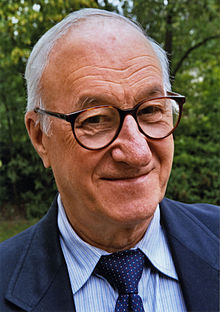Albert Bandura | |
|---|---|
 Bandura in 2005 | |
| Born | December 4, 1925 |
| Died | July 26, 2021 (aged 95) Stanford, California, U.S. |
| Nationality | |
| Alma mater | University of British Columbia (BA) University of Iowa (MA, PhD) |
| Known for | Social cognitive theory Self-efficacy Social learning theory Bobo doll experiment Human agency Reciprocal determinism |
| Awards | E. L. Thorndike Award (1999) |
| Scientific career | |
| Fields | Psychology, Developmental psychology, Educational psychology, Social psychology |
| Institutions | Stanford University |
Albert Bandura (December 4, 1925 – July 26, 2021) was a Canadian-American psychologist. He was a professor of social science in psychology at Stanford University.[1]
Bandura was responsible for contributions to the field of education and to several fields of psychology, including social cognitive theory, therapy, and personality psychology, and was also of influence in the transition between behaviorism and cognitive psychology. He is known as the originator of social learning theory, social cognitive theory, and the theoretical construct of self-efficacy, and is also responsible for the influential 1961 Bobo doll experiment.[2] This Bobo doll experiment demonstrated the concept of observational learning where children would watch an adult beat a doll and as a result do the same.
A 2002 survey ranked Bandura as the fourth most frequently cited psychologist of all time, behind B. F. Skinner, Sigmund Freud, and Jean Piaget.[3] During his lifetime, Bandura was widely described as the greatest living psychologist,[4][5][6][7] and as one of the most influential psychologists of all time.[8][9]
- ^ "The President's National Medal of Science: Recipient Details | NSF - National Science Foundation". www.nsf.gov. Retrieved October 14, 2021.
- ^ "Albert Bandura, originator of social learning theory, dies". States News Service. July 29, 2021. Retrieved March 22, 2023.
- ^ Haggbloom S.J. (2002). The 100 most eminent psychologists of the 20th century, Review of General Psychology, 6 (2). 139–152.
- ^ "Showcasing The Very Best Online Psychology Videos". All-about-psychology.com. Archived from the original on December 27, 2010. Retrieved December 30, 2010.
- ^ Foster, Christine (July 2, 2003). "STANFORD Magazine: September/October 2006 > Features > Albert Bandura". Stanfordalumni.org. Archived from the original on September 27, 2011. Retrieved December 30, 2010.
- ^ Vancouver, The (December 6, 2007). "Canadian-born psychology legend wins $200,000 prize". Canada.com. Archived from the original on September 3, 2011. Retrieved December 30, 2010.
- ^ Clay, Rebecca A. (March 2016). "Albert Bandura receives National Medal of Science". Monitor on Psychology. 47 (3): 8. Retrieved February 12, 2020.
- ^ "10 Most Influential Psychologists". Psychology.about.com. September 24, 2010. Archived from the original on January 21, 2016. Retrieved December 30, 2010.
- ^ C. George Boeree (December 4, 1925). "Albert Bandura". Webspace.ship.edu. Retrieved December 30, 2010.